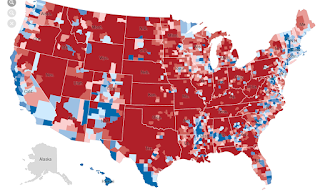I mean, don't get me wrong: I'm pretty sure that 47% of all y'all out there make terrible choices on any given and every given day, so why should election day be any different?
But today we are here specifically to address this idea that MrTrumpface somehow spoke to the concerns of "real Americans" with whom the media was out of touch.
"The media" is an incredibly vague and fairly useless phrase, so I'll narrow it down at least a little to the talking head anchors and roundtable sitters on network news programs who spent the last year pretending Hillary Clinton's "widespread unpopularity" which they harped on excessively until it finally started growing -- sort of beating life into it -- was a news story, rather than any of the bazillion policy issues, policy statements, political issues, social issues, current events, tragedies, hopeful outcomes, etc. happening all around us in the nation that Hillary addressed month after month after month. Those media squawking heads salivated breathlessly as they manufactured dislike for Hillary Clinton and offered up freely their interest in non-issue email invented "scandals" and pretended the Drumpfster was a legitimate option for the presidency and then acted stunned and shocked on election night. That was stupid of them, and they were one of the top two targets of my election night (Facebook) wrath, along with the delusional/bamboozled people who actually cast votes for DT.
But.
As the Chicago Tribune's Steve Chapman points out here, the media "failure" is yet another story we are telling ourselves as some especially loud voices insist that "real Americans" have spoken. (If anything, the nation "has spoken" via popular vote for Hillary -- the electoral college, which hasn't yet spoken, may be called upon to speak for Drump.) What's worse, though, is the idea that some residents of the U.S.A. are "real" and some are not. AND, that if for some reason there WERE some who were real and some who were not, that the minority, the far far far smaller number, would be the real ones because they live somewhere where they have to drive a gas-guzzling car to get anywhere instead of being able to hop on public transportation.
I mean, that's just silly.
It doesn't stop people from posting memes, though, with maps of the U.S. colored in red and blue by county vote, and it doesn't stop people from saying when they post those memes: "This is the people taking their country back!" Here's an example from The New York Times' presidential election results:
When I pointed out to one poster of memes (of oh so many pro-Drumpf memes) that the "more red" areas consist also of more open space, highways, and cattle, while the blue areas are where there are more people, she helpfully reminded me that "I don't think the cows were voting! It was people!"
Uh - my point exactly, lady. More people = blue areas. Fewer people = red areas.
But who's "out of touch with the real" United Statesians?
The media bashers like to say there are just a few liberal elite, a minority sitting in their elite New York penthouses and Malibu villas, making movies and hobnobbing with one another.
Actually, there are tens of millions of people who live in cities. And tens of millions of people who voted blue in this particular election. And we are real. Who are you to say only Plains state farmland plowers are real? That's absurd.
Imagine if you had a dozen people over to your house for a Super Bowl party (can't get more "real American" than that, now can you?) and realized at the last minute there was no soda pop so someone dashes out to get a 12-pack. He asks, should I get Coke or Pepsi? Yes, there are some people who don't drink soda and won't have either, but that's not his question. Coke or Pepsi? Let's say you take a vote. People are milling about, but at this moment three are sprawled on the couch in the giant living room watching pre-game jabber, and nine are standing clustered around the snack table in the small dining alcove because the snack food is interesting as is the conversation there. Two couch people vote for Pepsi and one for Coke. Living room, 2-1, Pepsi. Seven snack table people vote for Coke and two for Pepsi. Snack table, 7-2, Coke. Total, 8-4 Coke vs. Pepsi. But the host says, well, the living room is bigger and takes up more area so in order to get the "real" vote we'll give them more say. Pepsi it is.
Gross! (For those of us who don't care for Pepsi and can't beat the real thing.) But that's the argument I keep hearing put forward about why and how the electoral college represents rural areas' interests, and it's just as nonsensical as saying the people who take up more empty space are "real" while the people clustered together in a smaller physical space are not.






No comments:
Post a Comment